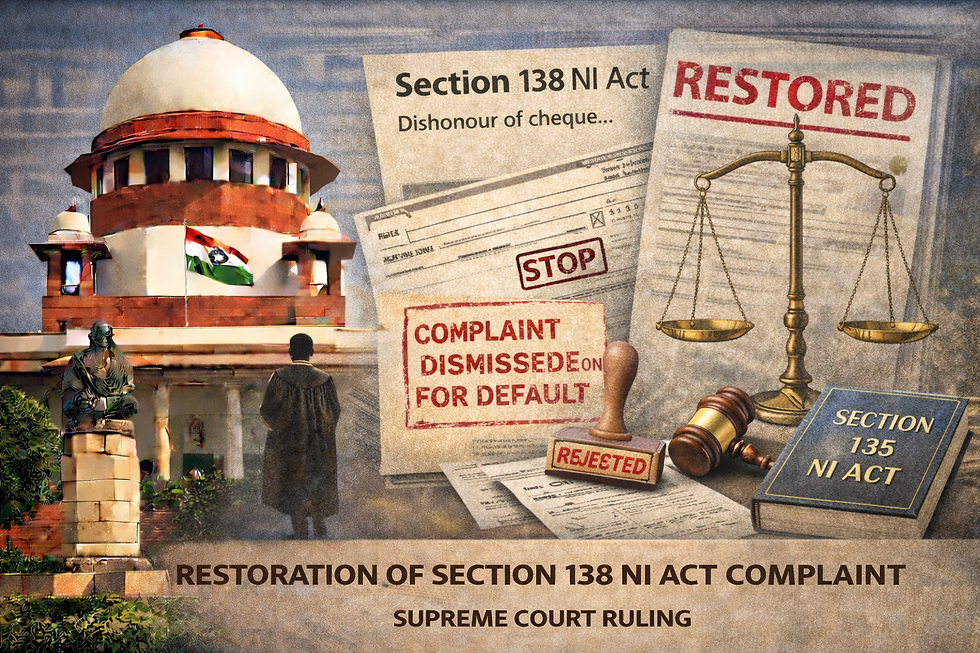Presumption of Innocence: Supreme Court Upholds Individual Liberty in Anticipatory Bail Case under Section 306 IPC
- Chintan Shah

- Jan 10, 2025
- 4 min read
Summary of the Judgement
Case Name: Mamta Kaur v. State of Punjab
Date: 9th January 2025
Judges: Hon'ble Ms. Justice Bela M. Trivedi and Hon'ble Mr. Justice Prasanna B. Varale
Advocates:
For the Petitioner: Mr. Nikhil Ghai, Advocate (through VC) and Ms. Sweta Rani, Advocate on Record
For the Respondent: Ms. Baani Khanna, Advocate on Record
Acts and Sections:
Section 306 of the Indian Penal Code (IPC)
Introduction
This case delves into the issue of anticipatory bail concerning allegations under Section 306 of the Indian Penal Code. The appellant, Mamta Kaur, challenged the rejection of her bail plea by the Punjab and Haryana High Court. The Supreme Court, recognising the specific circumstances, allowed her appeal for bail.
Case Background
The dispute originated from an FIR dated 14th February 2023, registered under Section 306 IPC at Police Station Gharinda, District Amritsar. The petitioner sought anticipatory bail, arguing that custodial interrogation was unnecessary. The High Court denied the plea, compelling the appellant to approach the Supreme Court.
Key Legal Questions
Whether custodial interrogation of the appellant is necessary?
What are the parameters for granting anticipatory bail under Section 438 of the Criminal Procedure Code?
Court’s Observations
Hon'ble Ms. Justice Bela M. Trivedi and Hon'ble Mr. Justice Prasanna B. Varale meticulously examined the case. They highlighted the following:
Compliance with Investigation Requirements: The appellant had complied with investigation requirements after the Supreme Court's earlier directive on 21st October 2024. The Investigating Officer confirmed that no further custodial interrogation was necessary.
"Custodial interrogation is not a routine step in every criminal investigation; its necessity must be established clearly."
Principle of Liberty and Bail: The Court emphasised the constitutional guarantee of personal liberty. Detaining an individual when such detention is unwarranted violates this principle.
"Bail, not jail, is a fundamental tenet of the criminal jurisprudence unless specific circumstances necessitate otherwise."
Conditions for Bail: The Court underscored that bail could be subject to conditions to safeguard against potential misuse. They authorised the trial court to impose suitable conditions while granting bail.
"The liberty granted by bail is not unbridled; it must coexist with the responsibility to adhere to the conditions set forth."
Decision
The Court accepted the appeal and directed that in the event of the appellant’s arrest, she should be released on bail. It also permitted the State to seek cancellation of bail if any conditions imposed by the trial court were breached.
Significance of the Judgement
Reinforcement of the Liberty Principle: This judgement reiterates the primacy of personal liberty in criminal jurisprudence. Arrests, especially under bailable offences, should not be made unless absolutely necessary.
Case-Specific Approach: The Court demonstrated its case-specific approach by evaluating whether the facts justified the need for custodial interrogation.
"Justice must be balanced with pragmatism, ensuring neither the rights of the accused nor the interests of justice are compromised."
Guidance on Anticipatory Bail: The ruling contributes to the jurisprudence on anticipatory bail, clarifying that courts must carefully consider whether custodial interrogation is indispensable before denying bail.
Necessity of Custodial Interrogation:The Supreme Court examined the principle of ‘necessity’—a cornerstone of criminal jurisprudence. The IO’s submission that custodial interrogation was not required decisively weakened the State’s case against the bail plea. The Court reiterated that arrest should not be used as a punitive measure or a coercive tactic unless absolutely warranted by the circumstances of the case.
Balancing Individual Liberty and Societal Interests:While acknowledging the seriousness of allegations under Section 306 IPC, the Court balanced societal interests against the appellant’s fundamental right to liberty. The principles articulated in this decision reiterate the doctrine of proportionality, ensuring that the rights of the accused are not unduly curtailed.
"The legal system must operate on the presumption of innocence, with due respect to individual liberty until proven otherwise in a court of law."
Guidelines for Lower Courts
This judgment underscores the need for lower courts to exercise due diligence while deciding anticipatory bail applications. The Court highlighted the procedural safeguards enshrined in Section 438 of the Criminal Procedure Code (CrPC). Key takeaways for trial courts include:
Conducting a detailed examination of case-specific facts.
Avoiding blanket denials of bail without proper justification.
Emphasizing adherence to judicial principles of fairness and proportionality.
Observations on Potential Misuse of Bail
The Court’s order included a cautionary note about the misuse of bail privileges. Hon'ble Justice Bela M. Trivedi stated:
"The respondent-State retains the liberty to approach the Court for cancellation of bail if any conditions imposed by the trial court are violated."
This observation serves as a deterrent against abuse of judicial leniency and safeguards the investigative process.
Socio-Legal Implications of the Judgement
Impact on Accused Persons: The decision affirms that procedural justice and individual liberty must not be undermined by mere allegations. For litigators, this case serves as a precedent for securing anticipatory bail in cases lacking substantive evidence for custodial interrogation.
Impact on Investigative Agencies: The judgment underscores that investigative agencies must provide clear justifications for custodial interrogation. Arbitrary denial of bail can no longer serve as a tool to pressure accused individuals without cogent reasons.
"This ruling shifts the narrative towards procedural fairness and discourages investigatory excesses."
Conclusion
This decision in Mamta Kaur v. State of Punjab underscores the judiciary's commitment to upholding the principle of personal liberty while maintaining the sanctity of the legal process. Hon'ble Justices Bela M. Trivedi and Prasanna B. Varale have provided a nuanced framework that litigators and courts can reference in similar cases.
This judgment reminds us of the adage:
"The law is not an instrument of oppression but a shield of liberty."
The ruling is a testament to the balance courts strive to achieve between individual rights and the collective interests of justice.



Comments